City of Gibraltar – Here’s Why It’s A Surprise Tourist Destination
In my previous post I explained why Alison and I, pretty well on a whim, decided to visit the British colony of Gibraltar after spending a few days in Nerja. We are staying at the wonderful Rock Hotel, just above the cable car station to the top of the Rock of Gibraltar and tomorrow we will be taking it to the top and walking down. I’ll report on that later, but today we are setting out to explore the city of Gibraltar which looks like it has plenty of interesting places in its own right. Please join us as we set out on foot from the hotel.
First, a brief recapitulation about the colony of Gibraltar or British Overseas Territory as it’s formally described. Gibraltar is a finger shaped peninsula that juts out from the Iberian peninsula precisely where the Mediterranean Sea ends and the Atlantic Ocean begins. The famous rock that crowns this peninsula is one of the two Pillars of Hercules as well as being the symbol of Prudential Insurance. Britain captured the strategic territory from Spain in 1704 and has held it ever since, withstanding numerous sieges and a referendum in 2002. Being a Canadian I know that referendums can be nearly as nerve wracking as a siege. However, unlike our last one where Quebecers narrowly voted in favour of remaining part of Canada, in Gibraltar almost 99% of residents voted to remain as a British colony – numbers usually seen only in North Korean and Cuban ‘elections’. The decision to stay British has paid off in spades as Gibraltar is now a major tourist, shopping and banking centre that has made it the 18th most prosperous place in the world. Spain is 44th.
Just before leaving our room at the Rock Hotel I took this picture of the busy harbour below. The number of vessels coming and going really makes it feel like it is a world centre of commerce. You can also see that it’s a beautiful morning.
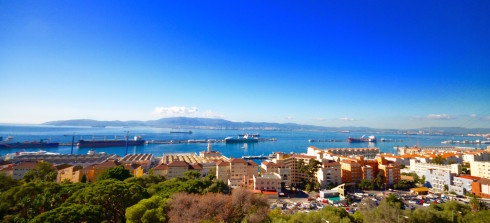
City of Gibraltar Alameda
Right across from the Rock Hotel is one of the entrances to the city of Gibraltar Alameda or Gibraltar Botanic Gardens as it is called on its website. Most Andalusian towns and cities have an alameda, which is technically a shaded street lined with trees. However, all the Spanish alamedas I’ve visited have actually been formal gardens that trace their roots back to the time that the Moors ruled Spain. In the case of Gibraltar that was a long time as it was the first place in Spain conquered by the Moors in 711 and stayed under Moorish control for 750 years. The name Gibraltar is a corruption of Jabal Tariq the first Muslim general who invaded the peninsula from Morocco.
While this garden does not date from the Moorish time, it is based on classic Moorish alamedas.
This morning the alameda is virtually deserted and although I wouldn’t call the area around it exactly noisome, this place is your almost stereotypical ‘oasis of tranquility’. Here is a map of the place done in traditional Andalusian tiles. As you can see it is pretty big and has a lot to see including a small zoo and numerous monuments.
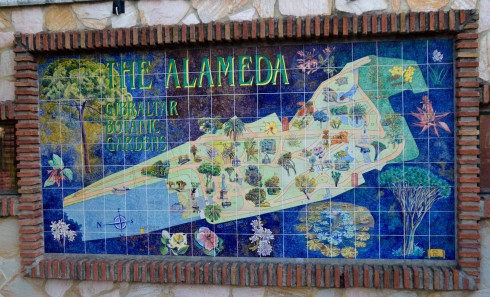
The Moors, perhaps because they were so close to the Sahara, were absolutely transfixed by the life giving necessity of water and have left Spain with a great legacy of beautiful fountains. They also understood that there is just something about the sound of flowing water that is tranquilizing. Add to that the effects of light on water and you have a reason to just sit and chill out. If only I could, but hey, thirty seconds of sitting quietly and enjoying the fountain is better than none.
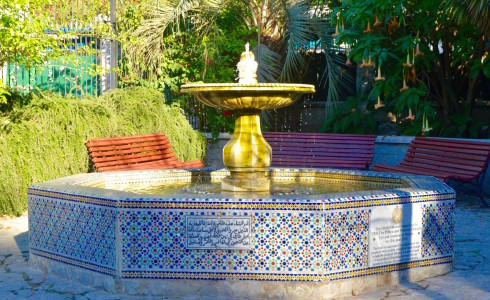
A small bridge affords a view this great botanic collage.
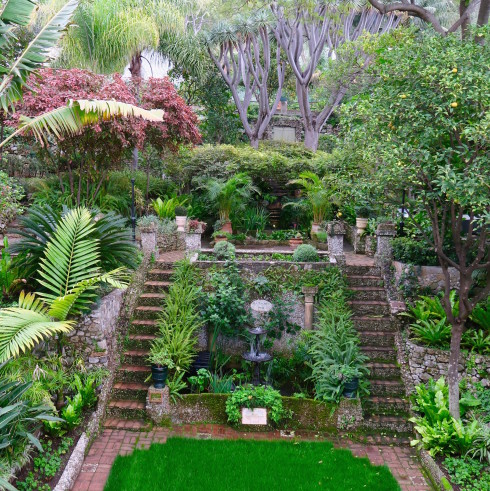
The city crest, appropriately an impregnable fortress, is laid out below.
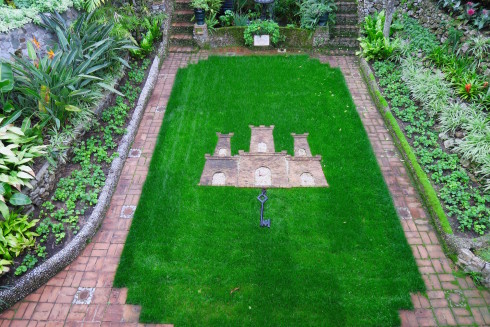
One of the most interesting flowers in the alameda is the red aloe that sends out a huge flowering stem from the base of this large succulent.
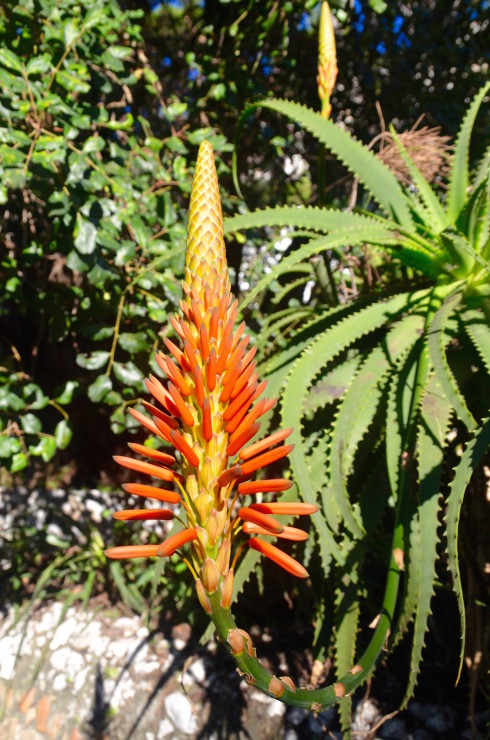
I mentioned monuments and here’s Alison with Molly Bloom.
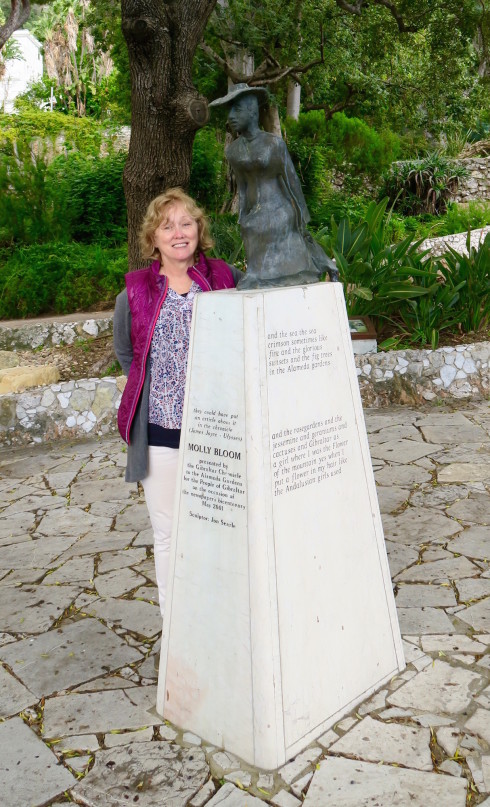
In case you’ve forgotten or don’t know, Molly Bloom is the wife of Leopold Bloom, the protagonist of James Joyce’s Ulysses, which many consider the greatest novel of the 20th century. So why’s she here? Molly was born and raised in Gibraltar and gets the final say with the last lines of the novel.
There are monuments to real people here as well including one of my favourites, the Iron Duke himself, Arthur Wellesley aka the Duke of Wellington. This monument dates way back to Wellington’s time and was cast from melted down cannons captured by Wellington’s forces. The pillar is Roman and came from the great city of Leptis Magna in modern day Libya. Wellington came to prominence as the successful general who repeatedly kicked the French asses in the Peninsular War fought on the Iberian peninsula.
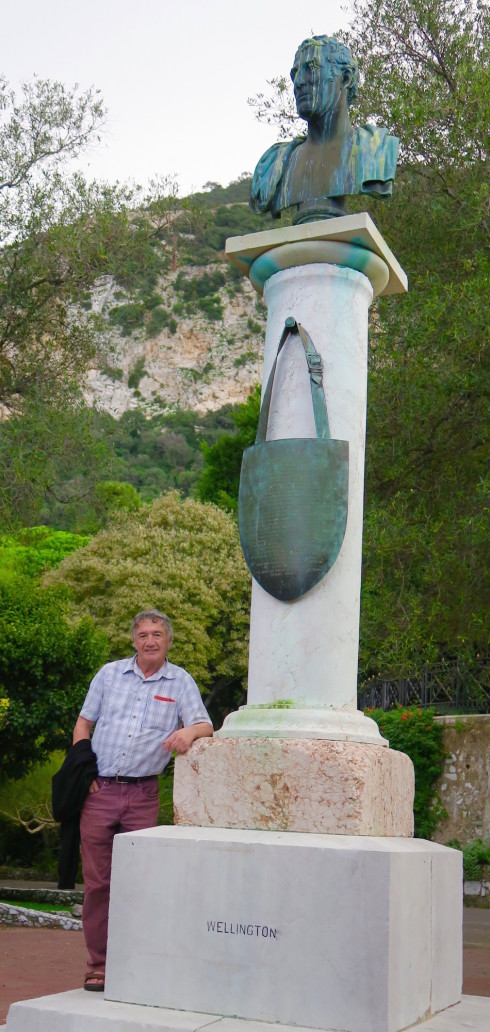
Trafalgar Cemetery
Moving on from the alameda, our tour of the city of Gibraltar continues through the old city gate beyond which lies Trafalgar Cemetery. The name would make you think it would have the graves of many of those who died in the Battle of Trafalgar, but it only has two. The Battle of Trafalgar was fought not that far from Gibraltar on October 21, 1805. While Lord Nelson’s fleet was victorious, he and hundreds of others were killed. In keeping with the traditions of the times, ordinary seamen killed in the line of duty were simply buried at sea (aka thrown overboard) so you wouldn’t find their graves anywhere. However, if you were wounded and made it to Gibraltar before croaking then you would get a grave like Captain Thomas Norman who suffered for over two months before succumbing to his wounds.
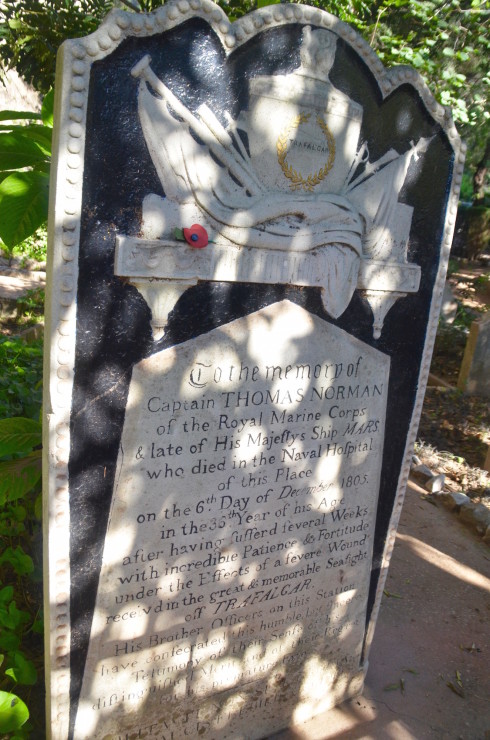
Burials only took place in Trafalgar Cemetery for just over two decades so there is a uniformity to the funereal monuments that is pleasing to the eye. This place rivals the alameda for tranquility and respite and has quite a few interesting graves.
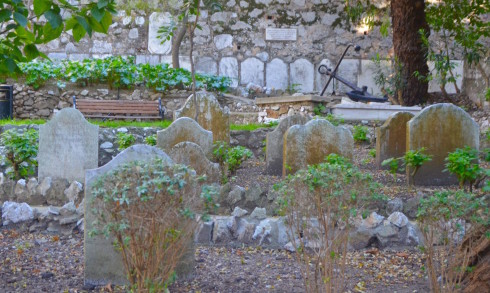
Here’s two naval lieutenants killed in the 1810 attack on Cadiz by a single cannon shot.
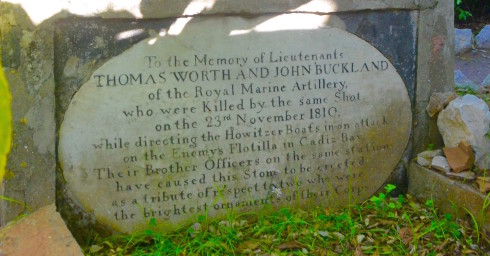
This tombstone of Charlotte Bolton is replete with folkloric symbols of death. According to the hourglass her time was definitely up.
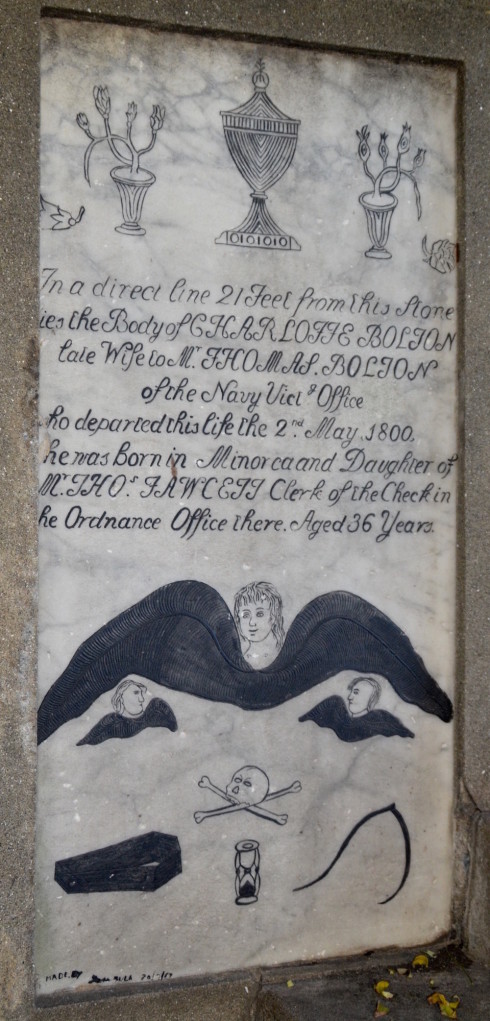
Not far from the cemetery we find the great admiral in person and I pose for this picture. Nelson and Wellington in one morning – not too shabby.
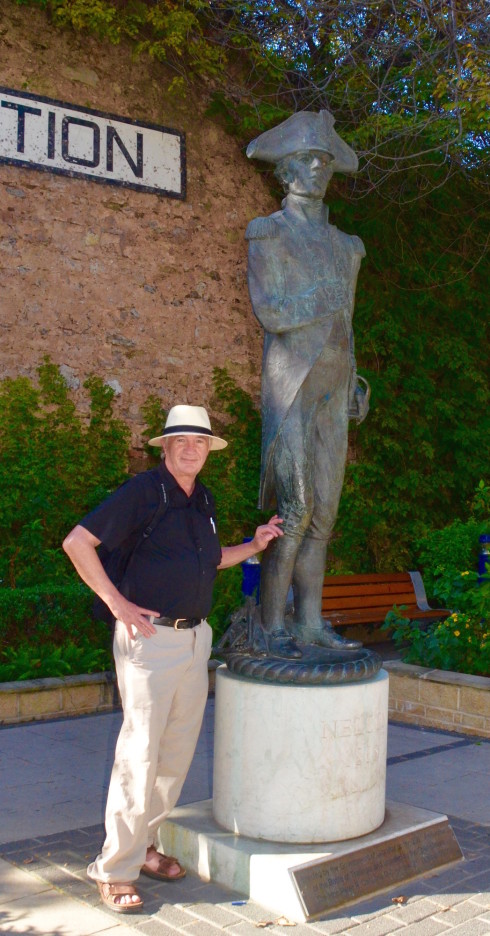
As in most places that might be considered as a crossroads, Gibraltar has a variety of religious affiliations, past and present. More particularly Christian, Moslem and Jewish. Here is the entrance to the Cathedral of the Holy Trinity, which is Church of England and not a mosque as you might think from the exterior.
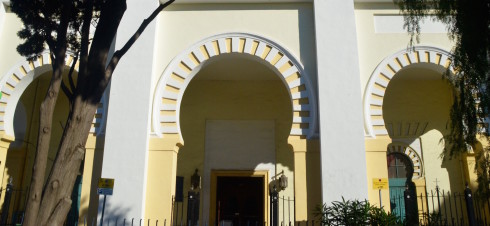
The mosque in fact looks like this, although I’m informed there is a more proper one at the end of the peninsula.
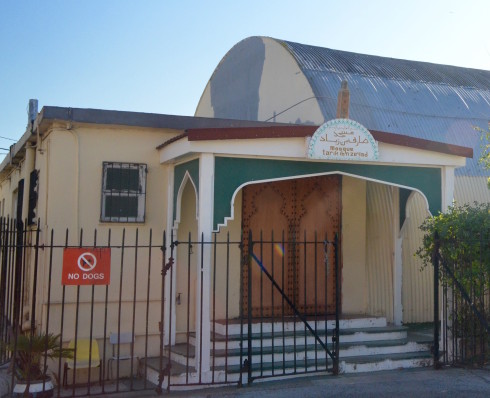
And here’s the door to the synagogue.
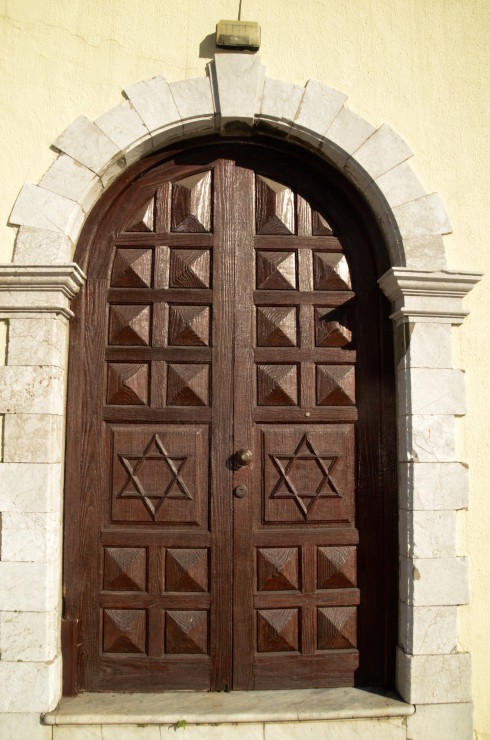
By now we are getting hungry and decide to stop for lunch at Jury’s which is right beside the courthouse which we will visit next. Notice that there is a Guilty and Not Guilty side to the cafe and Alison has chosen to site in the Guilty section. Guilty of what, I wonder? Anyway the food’s good.
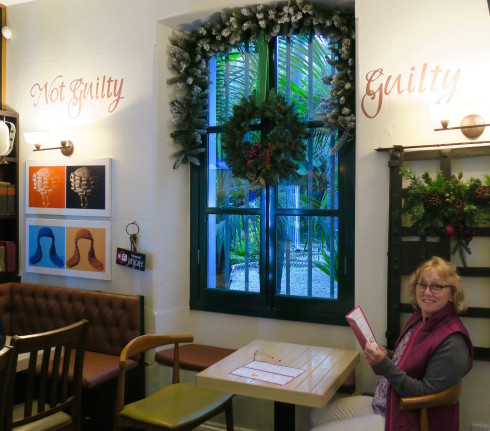
Gibraltar courthouse has a couple of things to recommend itself, particularly to Nova Scotians like us. It was here that the public inquiry was held into the fate of the crew of the Mary Celeste, one of the most famous unsolved nautical mysteries in history. The Nova Scotia connection is that the ship was built in Spencer’s Island, Nova Scotia.
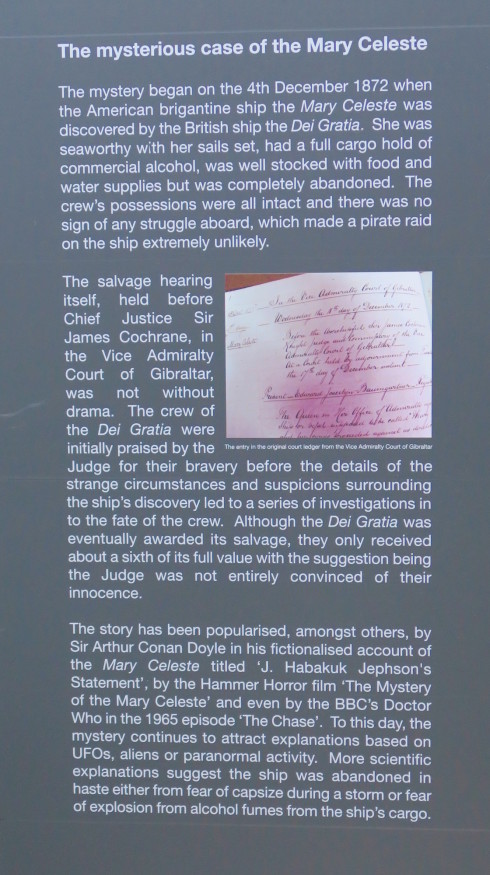
The other famous event that took place here happened on the courthouse grounds. Under the tree in the picture John Lennon and Yoko Ono were married on March 20, 1969. For many Beatles fans including me, this is a date that will remain infamous as the smartest and most creative of the Beatles fell prey to the guiles of one of history’s greatest poseurs. I think Mark Chapman was actually a Beatles fan and was trying to shoot Yoko when he missed and got John instead.
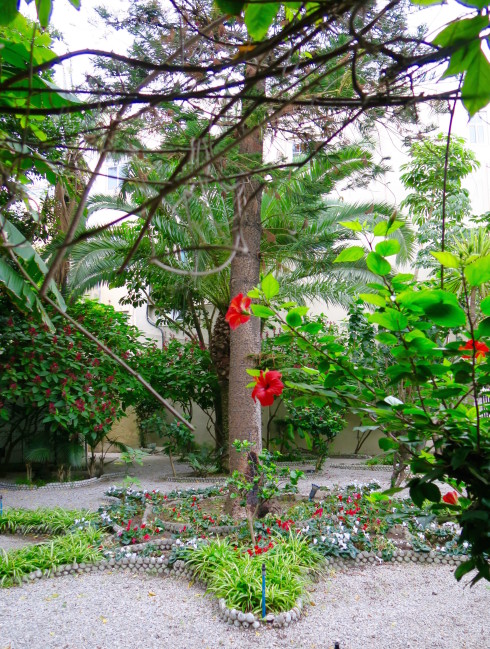
The main street of the city of Gibraltar has been pedestrianized and this afternoon is packed with both tourists like us and Spanish citizens looking for duty free goods.
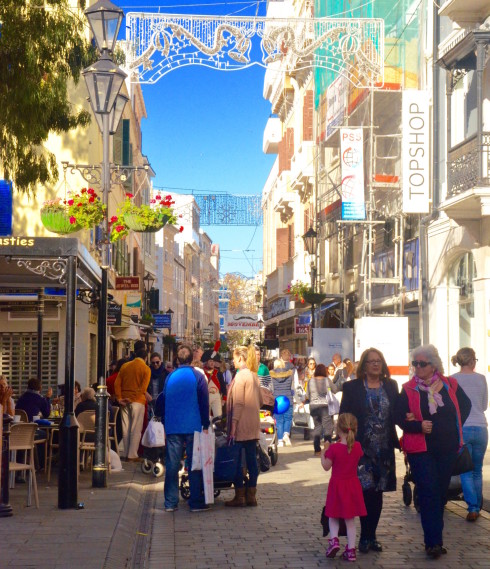
There is a Marks & Spencer which we pop into and find that the prices for good quality French wines are less than they would be in Paris, so I have no choice but to stock up. Time to head back to the hotel, put my feet up on the outdoor patio and watch the ships go by as we sip a glass of wine before dinner. La dolce vita in the city of Gibraltar. Join us tomorrow as we head up to the Rock.
Here are the links to the two posts I wrote about the visit to the Rock of Gibraltar – Part I and Part II.

